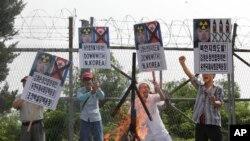North Korea’s alleged land mine attack on South Korean soldiers is likely to strain inter-Korean relations further, South Korean government officials and experts say.
South Korea’s Defense Ministry on Monday accused the North of crossing the Military Demarcation Line and planting land mines last week that maimed two South Korean soldiers. The North has not responded to the accusations.
The alleged mine attack drew sharp criticism from the South and the United States, two allies that form military alliance against the North.
In Seoul, the South Korean presidential office demanded an apology from the North.
“We sternly urge North Korea to apologize for this provocation and punish those responsible,” Min Kyung-wook, spokesman for Cheong Wa Dae, told reporters on Tuesday.
In Washington, the State Department condemned the attack.
“A United Nations Command Special Investigation Team determined the North Korean People’s Army violated sections of the Armistice Agreement by placing land mines along a known ROK [South Korean] patrol route. We join the U.N. Command in condemning these violations of the Armistice Agreement,” said State Department EAP spokesperson Katina Adams.
Former commanders of the U.S. forces in South Korea joined the criticism.
“Given that the side of the demilitarized zone where the mines were is South Korean territory, this is a provocation by the North Koreans onto South Korean sovereign territory,” Burwell Bell, former commander of U.S. forces in South Korea from 2006 to 2008, told VOA.
Bell suggested the United States and South Korean military should send a strong message to the North.
James Thurman, who commanded the U.S. forces in the South from 2011 to 2013, called for vigilance against the North, but cautioned against further escalation of tensions.
“It’s obviously prudent on the South’s part to remain very vigilant and make sure they always keep readiness at the forefront. But I would discourage any escalation over something like that,” said the general.
Seoul has enhanced propaganda broadcasts run by its military to Pyongyang as part of its retaliatory action against the communist country. Seoul resumed some anti-Pyongyang broadcasts over loudspeakers near the border for the first time in more than 10 years.
The alleged attack came amid heightened tensions over a possible missile launch by the North and joint military drills by the United States and South Korea.
Analysts in Seoul say tensions between the two Koreas are likely to escalate in the near future.
Yong-seok Jang, a senior researcher at Seoul National University’s Institute for Peace and Unification Studies, told VOA the two sides are “facing a phase in which there will be tension not only on the Yellow Sea but also on land along the demilitarized zone.”
A South Korean official who asked to remain anonymous said it will be difficult to find a momentum for dialogue between the two sides, adding the North responded to the South’s offer of talks with provocations.
The South says it has offered the North talks about 20 times since late last year, but Pyongyang has rejected each attempt.
Sungwon Baik and Jee Abbey Lee contributed to this report, which was produced in collaboration with the VOA Korean service.









